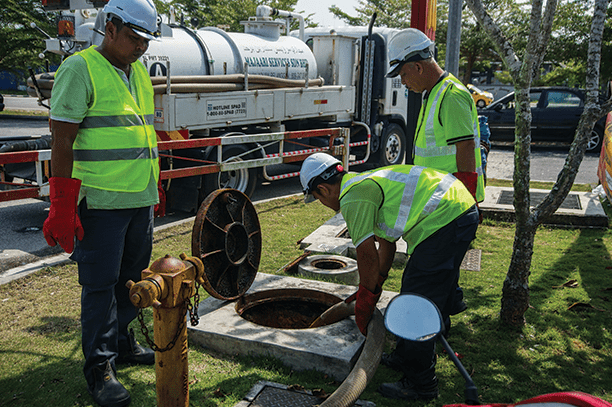A residence’s wastewater treatment and disposal system must include a septic system. Like any other part of a house, the septic system in Wilsonville needs regular maintenance to work properly. Your septic system needs to be properly maintained if you want to avoid health hazards and other dangerous effects. Performing routine checks, pumping, and maintenance of your septic tank system, saving water within your home, rerouting surface water flow away from your septic system, and avoiding driving heavy machinery or vehicles over the septic system.
Understanding the Aging Process of Septic Systems
For homeowners to make sure their septic system is operating correctly and to make plans for any necessary septic tank pumping in Wilsonville or upgrades, it’s crucial to understand the aging process of septic systems. Here are some of the signs that can give a clear indication of the aging process of the septic system:
- A septic system’s lifespan is influenced by several variables, including the material it is made of, its design, installation, service and exposure conditions, and maintenance. Concrete septic tanks often survive 50 years or longer, though older tanks might need to be better built than newer tanks. Tanks made of different materials, such as plastic, might have a comparable lifespan.
- If your septic system has a pump, many pumps and controls must be updated every ten to twenty years.
- Your system will age over time as a result of continual use. Regular maintenance and knowledge of your septic system can stop early failure.
- The age of the drain field, a crucial part of the septic system, must be considered. A drain field can last at least 50 years with proper care and upkeep.
- To preserve the longevity of the septic system, regular maintenance is crucial. Septic system upkeep includes pumping the tank every three to five years and examining the complete system every one to three years.
- Solids are conveyed into the drain field without being periodically pumped, blocking the pipes.
Physical Signs of an Aging Septic System
Here are, the following are some physical indicators of an old septic system:
- Puddles of water or wet areas might happen near the septic tank or drain field, even in dry weather.
- Bad smells: These may emanate from the drain field or the septic tank.
- Even in dry weather, bright green, luxuriant grass can develop over the drain field or septic tank.
- Blooms of algae These can happen in surrounding lakes or ponds.
- Showers, bathtubs, and sinks that drain slowly may indicate that the septic system is malfunctioning.
- High nitrate or coliform bacterial concentrations might be found in a water well.
Monitoring and Inspection
The wastewater treatment system for a house must include a septic system. Regular monitoring and septic pumping in Wilsonville are essential to ensure the system is operating effectively and to ward off any concerns that might arise and threaten human health or the environment.
Here are some pointers and recommendations for maintaining and examining a septic system.
1. Inspection specifications:
The Environmental Protection Agency (EPA) recommends doing a septic tank inspection every 3 to 5 years. At least every three years, basic gravity-fed septic systems with a tank must be inspected; other septic system types require more frequent inspections.
2. Visual assessment:
The system will typically undergo a visual inspection by a home inspector. This entails looking up the system’s age and maintenance record. The inspector will also check the system’s pressure by running the taps and flushing the toilets. This will demonstrate that the septic system can properly handle the water.
3. Checklist for Septic Tank Inspection:
To correctly evaluate septic systems, property managers, house inspectors, and licensed contractors should use the septic system service checklist in Wilsonville. Once the inspection is finished, you should view the report right away. Wearing rubber gloves and eye protection, photographing or attaching as-built blueprints, and obtaining digital signatures for legitimacy and accountability should all be on the checklist.
Potential Risks and Consequences of Neglecting an Aging Septic System
- System failure: If a system is not maintained or regularly pumped, it will eventually fail, requiring expensive septic and home repairs. Owners run the possibility of hazardous and expensive breakdowns if the septic system isn’t maintained.
- Health risks: Because they discharge the most wastewater into the ground and are the most commonly reported sources of groundwater contamination, failing septic systems pose health risks to your neighborhood. Sewage and sewage sludge also become the reason behind the growth of fungus that can cause diseases of the skin, eyes, and respiratory system.
- Failure or malfunction of a septic system can taint water supplies and harm the ecosystem, making them unfit for drinking, swimming, shellfish harvesting, and other agricultural purposes.
- Costly Repairs: Ignoring your septic system may need expensive repairs as well as possible property damage. By acting quickly when there are indicators of breakdown, the owner may avoid costly repairs, illness, and adverse environmental effects.
Conclusion
Improper system care, upkeep, and misuse can lead to system failure, health risks, for environmental contamination, expensive repairs, and safety problems. Septic system neglect can result in expensive repairs and possible property damage. As a result, it’s critical to maintain your septic system correctly. The symptoms of an aging septic system and how to spot possible problems that are covered in this blog post. These dangers and effects can be avoided with appropriate maintenance and regular checks. To avoid such kind of problems, you can always reach out to our team of professionals at American On-Site Septic. Contact us today to book your appointment.






